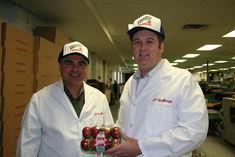
Changes in the consumer demographic and retail and wholesale customer preferences have seen JP Sullivan’s export focus switch entirely to the Irish market, with even the traditionally strong Scottish market disappearing off the radar as the national supermarket groups took hold and upped the specifications to levels that basically forced the hard-to-handle McIntosh off the list.
“We’ve been shipping to the UK since the 1930s,” says Ned O’Neill. “We used to export 30 per cent of our crop, but that’s down to about 10 per cent - although 80 per cent of that goes to Ireland. The McIntosh market has changed, but we have held onto our niche and we also ship some Empire. The bulk of what we ship is in eight-packs or 1kg bags. We are Mac specialists and there is a lot of faith in us to do the right job.”
With Tom Conaty and the Fyffes Group, JP Sullivan ran a successful McIntosh promotion last year, both in Northern Ireland and in the Republic - for the first time placing posters into 20x8-pack cartons before shipping for Superquinn and Musgrave retailers and holding a colouring competition for children, which received a huge response. “We hope to do something on a smaller scale again this year,” says John Iannacci.
“We like to have the same level of dedication to the export business year-in, year-out,” he says. “And as the domestic market is strong this year, hopefully that will prove beneficial for us in obtaining similar prices in the export market. We had a large volume of smaller apples last season and were keen to sell at the market price, but it is not going to be straightforward this year. We hope to send a similar volume to last season, but there is not a huge crop of the small-sized fruit that Ireland prefers and we will have to take into account the domestic value of those smaller apples.” Up to last week, US prices had averaged out at $3 a box more than last year.
The popular saying goes that it is more rewarding to grow property than apples in New England these days, but there are various local government initiatives to maintain open spaces and grants for farmers who agree to retain proportions of their land for agricultural uses. The State offers an ideal environment for apple production, says Iannacci. “New England is a unique area. In the [autumn] we have warm days and cool nights. We have great consistency of volume, we don’t have too many peaks and valleys. The main issue is the economics of it all. A lot of money has been invested in developing our business for export markets, so we want to keep the momentum going.”
Macs are extremely labour intensive, as the performance of each individual fruit on a tree can differ widely. O’Neill says that growers have to pick each tree three times, while in the packhouse automatic bagging is a no-no for fear of bruising. It is largely the inability of McIntosh to consistently hold its pressure during shipping and on-shelf that led to its gradual phasing out from supermarket shelves in Great Britain. “We used to ship eight-10 containers of Macs a week into England and another 15-20 containers into Scotland. The fruit still holds its distinctive, sweet taste, but those markets just aren’t there anymore,” he says.



